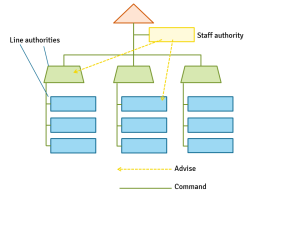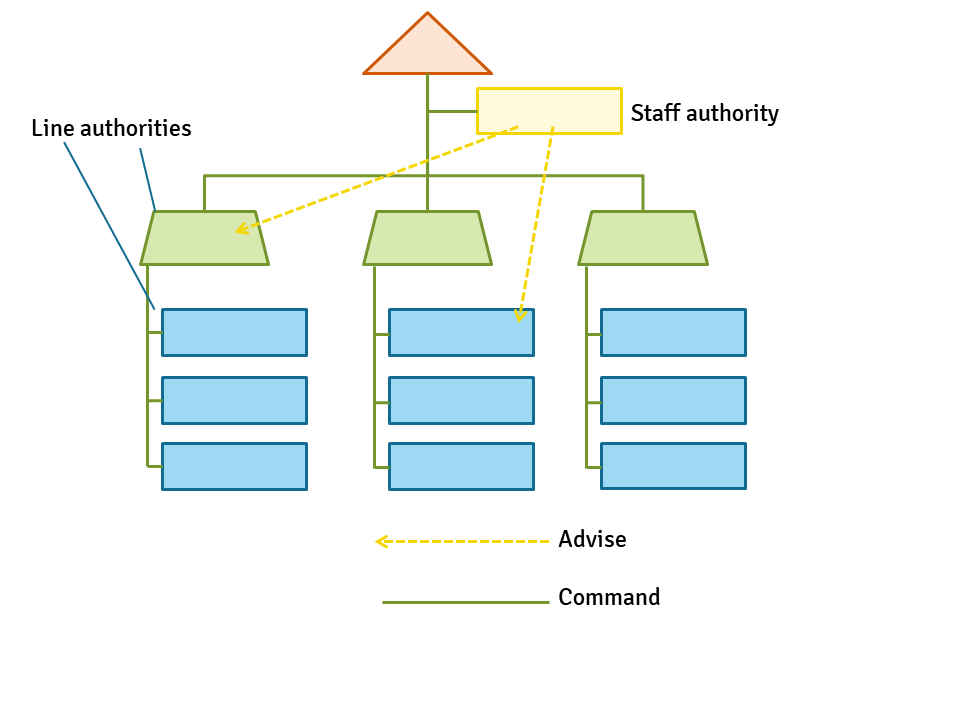Staff authority
Staff authority is "the right to advise, but not command, others who are not subordinates in the chain of command" [1]. It manifests itself only with advice and recognition when creating ideas. Nevertheless, the information or plans he presents must be approved by the line superior to be able to take effect. Here are some examples [2]:
- "A market researcher who gathers and analyses data on marketing problems and advises the marketing manager on demand for new products,
- An industrial engineer who prepares layout plans of plant equipment, production methods and operating standards based on time studies and forwards them for the acceptance of the production manager,
- An internal auditor who checks the accuracy of accounting records and suggests to the head of the accounting department,
- A personnel officer who advises the personnel manager on all dealings with unions".
- "A manager in human resources at Sony might advise the manager in charge of Sony's Home Entertainment Business Group on a hiring decision but cannot order him or her to hire a certain applicant" [3].
In the staff department there is a so-called a functional authority that is passed on to a person or department to control matters and activities. This department oversees vertical coordination by providing its valuable specialist knowledge. Functional authority is not only for specific departments or people [4].
Contents
- 1 Line vs. Staff Authority
- 2 Levels of authority of a staff man
- 3 Examples of staff authority
- 4 Advantages of Staff authority
- 5 Limitations of Staff authority
- 6 Other approaches related to Staff authority
- 7 Footnotes
- 8 References
Line vs. Staff Authority

Fig.1. Line vs. staff authority
Staff Authority is often compared to a line authority, with the difference that this kind of authority has the right to command direct subordinates in the chain of command and the competence of the staff is narrower. In addition, the words line and staff also define various functions in the organization.
The line function is directly responsible for creating and selling company products. We can include activities undertaken in the production and marketing department.
On the other hand, the staff function, which includes accounting, human resources or legal services, does not respond to the above-mentioned activities. Its task is to support linear activities. It consists, for example, in the fact that the marketing managers agree with the legal staff whether or not it is legal to create the advertisement in question [5].
Levels of authority of a staff man
The competence of the staff manager varies depending on the level [6]:
- The lowest level - on this level the staff man abilities, status and knowledge are so small that the head of the line only consults him voluntarily.
- The second level - consultations are mandatory for each department, people of the line can not ignore the staff man when taking action.
- Third level - in this case, the authority of the staff man is so large that he is given concurring authority and only by his consent people can take any action. However, if the staff and people of the line do not agree, they can appeal to the next, higher rank.
- The highest level - the staff manager, instead of issuing a recommendation, has the power to direct orders to people from other departments.
Examples of staff authority
Generally speaking, staff authority involves making decisions and taking action to:
- Establish priorities, plans and policies
Staff can make decisions on how to prioritize plans and policies to ensure the organization is meeting its goals and objectives.
- Allocate resources
Staff can decide how to distribute resources in order to meet organizational needs and objectives.
- Appoint personnel
Staff can appoint personnel to positions that are in line with the organization’s goals and objectives.
- Develop and implement programs
Staff can develop and implement programs that are in alignment with the organization’s mission.
- Monitor performance
Staff can monitor the performance of personnel and programs to ensure the organization is meeting its goals.
In general, staff authority is necessary for an organization to function effectively and efficiently. It allows personnel to make decisions and take action in order to fulfill the mission of the organization.
An example of staff authority would be a supervisor of a team of customer service representatives. This supervisor would have the authority to make decisions and take action related to hiring, training, and overseeing the customer service representatives. They would be able to set priorities, allocate resources, and develop and implement programs related to customer service. They would also be able to monitor the performance of the customer service representatives to ensure that they are meeting the organization's goals and expectations.
Advantages of Staff authority
- Greater flexibility: Staff have the ability to be more flexible in their decision-making and actions. This can be beneficial in times of crisis or changing conditions.
- Improved efficiency: Staff have the power to make decisions quickly and take action quickly. This can help organizations become more efficient in their operations.
- Increased morale: Staff have the authority to provide direction and make decisions that can help improve morale among personnel.
Limitations of Staff authority
Staff authority is not absolute, and it is subject to review by higher authorities. It is important to note that staff authority does not include the authority to:
- Make binding commitments: Staff cannot make binding commitments on behalf of the organization without higher approval.
- Engage in illegal activities: Staff cannot engage in activities that would be deemed illegal by the organization.
- Spend funds without authorization: Staff cannot spend funds without prior authorization from higher authorities.
- Override the decisions of higher authorities: Staff cannot override the decisions of higher authorities or their directives.
- Delegation of Authority: Delegation of authority is the process of assigning responsibility and authority to another person to complete a task or decision. This allows staff to assign tasks to other personnel and trust them to complete the task in a timely manner.
- Accountability: Accountability is the process of ensuring that personnel are held responsible for their actions and decisions. Staff can ensure personnel are held accountable for their actions and decisions by establishing clear expectations and monitoring performance.
- Performance Evaluations: Performance Evaluations are a critical part of staff authority as they allow staff to assess the performance of personnel and ensure they are meeting the expectations of the organization.
Staff authority is a necessary part of any organization as it allows personnel to make decisions and take action to fulfill the mission of the organization. It encompasses delegation of authority, accountability, and performance evaluations, all of which are necessary to ensure the organization is functioning effectively and efficiently.
Footnotes
- ↑ Ch. Williams 2012, pg. 502
- ↑ G. Murugesan 2014, pg. 67
- ↑ Ch. Williams 2012, pg. 502
- ↑ V.S. Bagad 2008, pg. 94
- ↑ Ch. Williams 2012, pg. 503
- ↑ G. Murugesan 2014, pg. 67
| Staff authority — recommended articles |
| Delegation of authority — Functional authority — Levels of management — Front line management — Project steering committee — Job scope — Formalization — Board — Quality policy |
References
- Bagad V.S. (2008), "Financial & Industrial Management", Technical Publications, India, vol. 1
- Crewe B., Liebling A., Hulley S. (2011), Staff culture, use of authority and prisoner quality of life in public and private sector prisons, "Australian & New Zealand Journal of Criminology", SAGE Publications, UK
- Murugesan G. (2014), "Principles of Management", Laxmi Publications, New Delhi
- Quinn S. (2010), "Management Basics", Bookboon, UK
- Ramachandra A. (2006), "Economics, Accountancy and Management", Tata McGraw-Hill Education, India
- Starling G. (2010), "Managing the Public Sector", Cengage Learning, USA, vol. 9
- Williams Ch. (2012), "Management", Cengage Learning, USA, vol. 7
Author: Angelika Guzik

